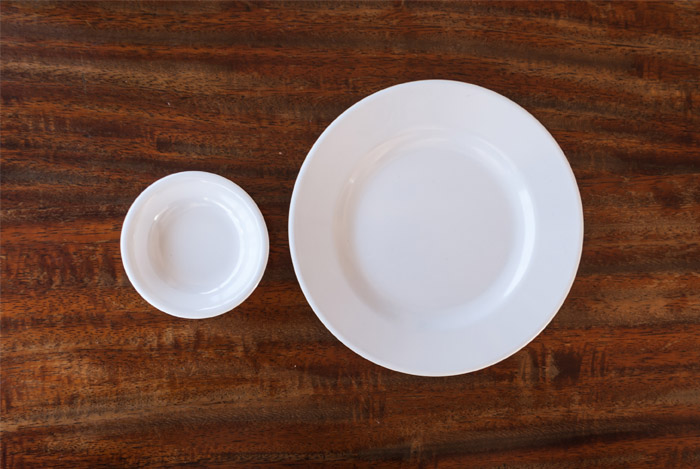Think for a moment – how many times have you caught yourself sitting on your couch with a bag of chips, only to look down and realize you ate the entire bag?
And when you really think about it, were you even hungry to begin with?
If you’ve done this, you’re guilty of mindless eating. At least, that’s the phrase coined by Cornell University food psychologist Brian Wansink, PhD. He created the term to describe the eating habits of modern humanity that can lead to unnecessary weight gain.
Our species used to be active, hunting for our survival and eating only as a reward of great effort. But now, because of our often sedentary lifestyles, we are way more prone to such absentminded behavior than ever before.
So, are you ready to learn about what causes your mindless eating and how to put a stop to it? If so, keep reading. You may even discover that your habit can be used to your own advantage.
What Leads to Mindless Eating?

Mindless eating can be the result of many different factors that vary from person to person. However, one of the most widespread problems we face in the United States is that our eyes truly are bigger than our stomachs.
When testing this, Brian Wansink had some interesting discoveries. He said:
“We asked 150 Parisians how they knew they were through with dinner and they said, ‘When we’re full.’ When we asked 150 Chicagoans the same question, they said, ‘When the plate is empty.’”
One experiment showed that people poured about 37 percent more liquid in short, wide glasses than they poured in tall, skinny glasses that were actually the same volume.
Another experiment suggested that people would eat significantly more food if it was served in “extra-super-size ginormous buckets” than they would if it was in regular (large) containers.
“Even if the popcorn was stale,” Wansink added.
Sometimes, though, you may actually feel as though you’re always hungry. This can be caused by a number of factors, which include:
- Skipping meals
- Not getting enough protein
- Eating too quickly
- Food addiction or other eating disorders
- Too much stress
- Drinking too much alcohol
- Poor sleep habits
- Not eating enough fatty foods
- Eating processed, refined carbohydrates instead of complex carbohydrates
- Not getting enough fiber
Tip: If you want to learn more about how to fight off insatiability, check out this blog post on the reasons why you’re always hungry!
The Effects of Modern Portion Sizes

Have you ever noticed how you feel disappointed when the only bowl in the cabinet is a small one?
The bigger ones might be dirty, so you’re forced to use the smaller dish.
But once you’re finished eating one serving from the smaller bowl, you find you actually feel full. You didn’t need the larger bowl after all.
The reason we eat more than we need to when we have a bigger plate is called the Delboeuf illusion. It’s long been known to cause us to misjudge how large identical circles are when they’re surrounded by larger circles. The more “white space” around a circle, the smaller it appears – even if it’s the same size as its neighbor.
Because of this, we end up putting way more food onto larger plates and think we actually want that much food. But just because there’s empty space on that plate doesn’t mean you have to fill it up.
Even if you don’t have huge plates or go out to eat at restaurants all the time, you may still come in contact with huge portions. Over the past few decades, our portions have increased dramatically. As a result, so has our calorie intake.
In fact, many foods have increased in calorie count as well, sometimes by as much as a hundred calories per item.
A lot of this has to do with the market – when we buy foods, we want the biggest bang for our buck. This is called “value sizing,” and is a big contributor to why our portions have gotten so much larger.
People simply don’t want to pay a lot of money for a small amount of food – even if it’s the same they were paying decades ago, just adjusted for inflation.
And when all our portions are that much larger, our mindless eating becomes that much worse. Every meal consumed is that much more calories than we really needed.
Controlling Your Habit of Mindless Eating

The first step to controlling your mindless eating is awareness of your habit.
Here are a few other ways of curbing your behavior for the better:
- Stop eating at set meal times when you don’t have to.
Some people feel like they’re required to eat based on a specific structure, even if they aren’t hungry. When your job gives you a lunch break, you may feel obligated to go get a bite to eat from the fast food joint nearby. When your family sits down to eat each evening, you may feel your plate just because everyone else is doing it.
Stop doing this. When you start to buy food or fill a plate, figure out if you’re really hungry – and how hungry you really are.
- Don’t eat while distracted by other things.
Countless millions of people lounge in front of the television every night and gorge themselves without thinking about it until there’s nothing left to eat. Some people sit in front of their computers or video game consoles shoveling grub in their mouths and hardly even chew their food.
All you really wanted was something to do to make you feel active. When your brain is shutting off and staring at a screen, it has a desire to multitask and accomplish something – so you might prepare that plate of pizza rolls you never needed in the first place.
- Ignore other peoples’ plates.
A lot of our portion control depends on what everyone around us is eating.
“If you’re a woman following a woman in a buffet line,” said Wansink, “44 percent of what you eat will have been determined by what the person ahead of you eats. If they eat a lot, you eat a lot; if they eat a little, you eat a little.”
So stop paying attention to what other people get and think about what’s best for you.
- Don’t eat to control your mood.
One major factor in mindless eating is stress or depression. Many people have certain comfort foods they turn to when they feel upset, without realizing that they’re using food as a coping mechanism.
A way to combat this is to keep track of what triggers your need for food. Every time you have to sit down to write a grad school research paper, do you start chowing down on everything in your pantry? By taking note of this behavior, you can begin to combat it.
- Stop eating out of boredom.
Another prime example of mindless eating is the classic habit of bored eating. Maybe you’re sitting in your home and can’t figure out anything to do, so you make a snack. Perhaps you want to hang out with a friend or two but can’t think of anything else to do but go to a restaurant. Did your body actually tell you you were hungry? Doubtful.
To put a stop to these behaviors, always ask yourself the question of whether or not you actually are hungry. When you’re in the middle of a meal, stop yourself and take a break – are you still hungry, or could you save the rest for later?
This is called mindful eating.
How Mindful Eating Works

To fight against mindless eating, you need to get rid of everything in your environment that can lead you to eating too much – and unhealthily.
First, invest in some smaller plates. Or, if you already have salad plates, put those huge dinner plates in a closet or pantry somewhere only to be used for those big holiday meals.
Redesign your kitchen to keep the healthiest foods at eye level in the pantry and refrigerator. If you have candy, hide it – even from yourself.
Stop eating in front of your TVs, computers, or other devices. Eat in the kitchen or dining room and focus on your meal. Savor every bite so you appreciate the flavor more and feel fuller as a result.
Also, try and buy only healthy foods if you can manage it. That way you’ll cut off the temptation that comes with unhealthy foods. And if you must eat mindlessly, at least what you’re stuffing into your face is good for you.
The Last Word

If you want that healthier, sexier body, you can’t allow yourself to keep doing what you’ve been doing. You first have to recognize that a change is necessary.
According to Wansink, it’s all about “what you eat, how much you eat, and how frequently you eat.”
That’s where many people fail when it comes to their health – and to preventing mindless eating. They simply aren’t paying attention to what they put in their bodies. If you tell them they should start paying attention, they act like they’re doing nothing wrong and continue with all their bad habits.
Don’t be one of these people. Take control of your health. Stop mindless eating today.
Have you fallen prey to mindless eating at times in your life, and were you able to stop? Share your story in the comments below!
The post How to Prevent Mindless Eating appeared first on Nutrition Secrets.
http://www.nutritionsecrets.com/how-to-prevent-mindless-eating/
No comments:
Post a Comment